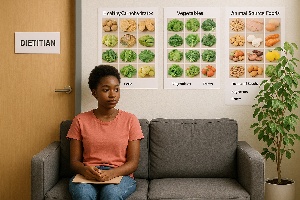- Home - News
- Elections 2024
- News Archive
- Crime & Punishment
- Politics
- Regional
- Editorial
- Health
- Ghanaians Abroad
- Tabloid
- Africa
- Religion
- Photo Archives
- Press Release
General News of Tuesday, 27 May 2025
Source: www.ghanawebbers.com
Diet as a Tool for Managing Endometriosis
Understanding Endometriosis and the Role of Nutrition
Endometriosis is a long-term condition. It causes tissue similar to the uterus lining to grow outside the uterus. This can lead to inflammation, scarring, and infertility. About one in ten women of reproductive age worldwide are affected.
In Ghana, specific statistics are limited. However, reports indicate it causes significant infertility and pelvic pain. Emerging evidence shows that nutrition can help manage symptoms. Dietary strategies that reduce inflammation and support hormone balance are beneficial.
How Nutrition Affects Endometriosis
Endometriosis symptoms include pelvic pain, fatigue, and painful menstruation. These issues stem from chronic inflammation and hormonal imbalances. The foods we eat influence these processes significantly. Therefore, diet is a valuable tool for managing this condition.
Anti-inflammatory Foods to Reduce Pain
Chronic inflammation is a key feature of endometriosis. Eating more antioxidant-rich foods can help combat this issue. Local fruits like oranges and mangoes are good sources of antioxidants. Vegetables such as kontomire, carrots, and tomatoes also provide benefits.
Spices like ginger and turmeric can be helpful too. Omega-3 fatty acids from fatty fish like mackerel or sardines support inflammation regulation.
Dietary Fiber for Hormonal Regulation
Excess estrogen worsens endometriosis symptoms. High-fiber diets help remove excess estrogen through digestion. Whole grains like brown rice and maize support this process effectively.
Legumes such as beans and bambara are also beneficial. Vegetables like cabbage and garden eggs contribute to fiber intake.
Limiting Red and Processed Meats
High intake of red and processed meats may increase inflammation. Foods like corned beef, sausages, or fried meats should be limited.
Instead, choose plant-based proteins such as beans or lentils. Moderate amounts of fish or poultry are also good options.
Key Micronutrients: Vitamin D, Magnesium, and More
Vitamin D supports immune function in women with endometriosis. In Ghana, safe sun exposure usually provides enough vitamin D. Food sources include eggs and oily fish.
Other nutrients like magnesium (in leafy greens), vitamin E (in avocados), and iron (in fish) may reduce fatigue during heavy menstrual bleeding.
Personalized Adjustments for Digestive Symptoms
Some women experience digestive symptoms with endometriosis, such as bloating or irregular bowel movements. Diets like low FODMAP or gluten-free may offer relief but can be restrictive.
These diets should be tried under professional guidance. Keeping a food diary may help track meals that trigger symptoms.
Final Thoughts
No specific diet cures endometriosis completely but a nutrient-rich diet helps manage symptoms effectively.
In Ghana, where specialist care may be limited for many women, food becomes an important part of self-care.
Every woman's experience with endometriosis is unique; dietary changes should fit individual needs.
If you have endometriosis, consult a registered dietitian or healthcare provider for personalized nutrition advice.
For more educational content on nutrition, join the Full Proof Nutrition WhatsApp channel or email us at [email protected].
Written by Dr. Laurene Boateng (PhD, RD). She is a Registered Dietitian at the University of Ghana's Department of Dietetics.











